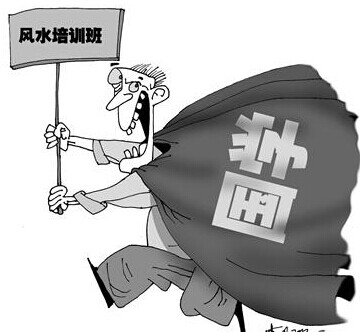ZHANG QINGLI,ZHANG JIE: Study of traditional Chinese culture is more than just rituals

The excessive training organizations manipulated as financial tool has distorted the study of traditional Chinese culture.
“The standards for being a good student and child are handed down by Chinese saints and sages of the ancient past,” chant students adorned in classical Han clothing. “Be dutiful to our parents and respectful to our siblings…”
The students taking part in this cadenced recitation reenact scenes of attending classes in ancient times.
This is commonly interpreted as part of the current craze of studying traditional Chinese civilization in preschool education. At the same time, some universities, targeting company executives, are opening a spectrum of courses on China’s ancient civilization.
While simultaneously emerging across various venues, studies of traditional Chinese civilization also stir up some problems: is this a tool to disseminate excellent traditional culture or a platform to make a fortune through unfair means? The craze of reexamining ancient Chinese civilization, while stimulating people’s awareness of age-old culture, also tends to make proliferating classes more and more mediocre.
Commercialization distorting study
Since the 1999s, lessons on classical Chinese civilization have extended from secluded temples to the public. However, impacted by the tides of commercialization, the study of ancient civilization, while sometimes characterized as dignified, quaint, or profound, is becoming a financial tool for some people to accumulate wealth.
“Currently, the training organizations and agencies are excessively plentiful,” noted He Chengxuan, a research fellow at the Institute of Philosophy, part of the Chinese Academy of Social Sciences.
“The real interest of some organizers lies in making a profit rather than promoting study, which leads to students blindly enrolling and over-high tuition fees,” said He.
He said that while a certain level of fees for these courses is allowable, “charging over 10,000 yuan for the lessons will inevitably distort the study.”
More importantly, the courses are opened without discretion and the texts are chosen perfunctorily for many training classes. This may cause much confusion. He Chengxuan remarked, with great concern, that operators of some training classes mistake the “dross” for the “essence” and instill outdated, backward, and falsified concepts of classical works into students. Under the camouflage of lesson teaching, these training classes are prone to misleading the public.
Formalism to be abandoned
Some scholars say that the contemporary craze of studying ancient Chinese civilization, in essence, is a sign that formalism is taking the upper hand in current cultural trends. Huang Yushun says the core of Confucianism is “humanity, righteousness, and ritual,” with the first two precepts considered basic and the third one less fundamental.
However, some people mistake rituals, institutions and norms as the basis of Confucianism, taking for granted that the systems and standards established over the course of history should be indiscriminately imitated. This is actually a fundamentalist attitude.
Moreover, in recent years, the dissemination of traditional Chinese culture has tended to be formalistic, equated with merely wearing Han clothing and holding Confucius-worshipping ceremonies.
The cultural fibers, however, are overlooked. Wu Jianmin, a former Chinese ambassador to France, once said that traditional Chinese culture should not be transfigured into a sideshow. A case in point is Sichuan opera, which is misunderstood by many as an art of simply changing facial makeup or doing magic. This is, no doubt, a superficial understanding of Sichuan opera.
Academic study as the benchmark
To carry forward the study of traditional Chinese civilization, parochial cultural nationalism should be avoided. Ji Xianlin, a master of Chinese culture, has proposed broadening the vision of study by researching the concept of “great Chinese culture.” Ji advocates integrating traditional scholarship on the Han nationality and other ethnic minorities into the realm of study.
He Chengxuan supports that approach. This can help advance cultural integration and the cultural cohesiveness of the Chinese nation, He says.
Peng Guoxiang, director of the Cultural China Center, part of the Institute for Advanced Humanistic Study at Peking University, says the transmission of traditional culture should rely on professionals who are truly knowledgeable in the field. Those who promote the study of ancient civilization purely to make a profit are not qualified to shoulder the responsibility of transmitting China’s cultural heritage.
What kind of role should scholars play in popularizing traditional culture?
Peng Guoxiang pointed out that academic study should be the basis for publicizing traditional culture. Only when academic study becomes the benchmark and guide, can the quality of studying ancient Chinese civilization be enhanced.
Zhang Qingli, Zhang Jie are reporters from CSST.
